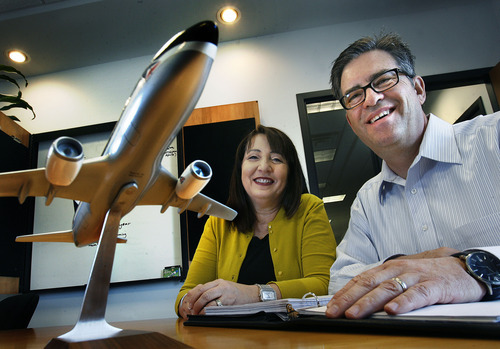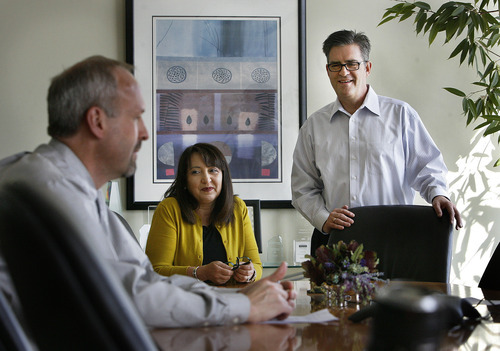This is an archived article that was published on sltrib.com in 2012, and information in the article may be outdated. It is provided only for personal research purposes and may not be reprinted.
Over the past 15 years, travel agents have wrestled with three forces that threatened their livelihoods:
• The growth of online booking sites such as Expedia, Travelocity and Orbitz.
• The terrorist attacks of Sept. 11, 2001.
• The recession that began in late 2007.
Riding that rocky wave, a Utah agency has managed to survive and emerge stronger than ever.
Mike Cameron, owner and CEO of Christopherson Business Travel, credits a "pretty simple" formula for his company's endurance. He and wife, Camille, purchased the decades-old company in 1990 and in 22 years have grown their staff from two to 248 and increased total travel bookings from $1 million to $287 million.
After acquiring Christopherson Travel and Tours — which was founded in 1953 by Merrill and Lucille Christopherson — the Camerons narrowed its focus to business rather than leisure travel bookings.
"Instead of trying to be all things to all people, we decided to focus on one thing and try to do it better than everyone else," Mike Cameron said.
After that, they employed a three-pronged philosophy — hire the best people, offer a unique value proposition to clients and share the company's wealth with the employees who generated it.
"We pay quarterly incentives that are very generous," Cameron said. "It's simply good business." The company also offers an attractive 401(k) retirement program and flexible work arrangements.
In the course of 22 years — an era that Mike Cameron said brought "total upheaval" to the industry— his company developed proprietary travel management software to gain a competitive edge. Today, Christopherson's online menu features 11 trademarked and patented technologies.
Christopherson also ranks as the largest travel agency in Utah, and in addition to its Murray location, it operates full-service offices in Denver and San Francisco.
Its client list includes Barrick Gold (the world's largest gold producer), Huntsman Corp. (which manufactures and markets various chemicals globally), Intermountain Health Care, Cambia Health Solutions (formerly Blue Cross Blue Shield), MonaVie, Nu Skin, Usana, the state of Utah, the University of Utah and Xango.
Christopherson ranks 14th in agency size in the nation, serving more than 900 clients.
But the path to success hasn't been without its hurdles.
—
Rough patches • The airlines for decades paid travel agents a 10 percent commission on seats sold. But according to the American Society of Travel Agents, that practice ended in March 2002 — just months after commercial jets were hijacked and flown into the twin towers of New York's World Trade Center and the Pentagon.
On Sept. 11, 2001, Mike Cameron stood in line at the Salt Lake City International Airport, waiting to board a plane, when the listings on every terminal screen changed to "canceled."
By coincidence, he and his wife were scheduled later that week to host the grand opening of new offices for Christopherson at 5588 S. Green St. in Murray. Even though all commercial planes were grounded and the skies had gone silent, the event went on as planned. But instead of the expected celebration, it took on a somber and patriotic mood.
Although bookings plummeted in the fourth quarter, Christopherson still saw moderate growth in 2001. In fact, the only time the business has registered a loss was at the depths of the recession in 2009, when sales dropped from $247 million to $240 million, Cameron said.
In 2011, the company surged to $287 million, and this year's first quarter showed a 30 percent gain over the same period the year before.
A 6 percent uptick in travel accounts for part of that gain, Cameron said, and he attributes the rest to growth in market share.
"The fact that we have such a high market share in Utah is testament to the fact that we can adapt rapidly to the cataclysmic changes," said Cameron, who was recently named among the state's top eight CEOs of 2012 by Utah Business magazine.
Cameron's strategy involved hiring the best agents in the industry, developing the travel management software to give Christopherson a competitive edge in terms of service, and then consistently sharing the wealth through employee incentives.
"Those are the three things we've done," Cameron said. "If you can do those things just a little better than your competitors, you can grow from '$1 mil' to '$287 mil' in 22 years."
Bountiful based Hess Travel employs 40 people and is Christopherson's closest competitor, ranking second in size in Utah and 26th largest in the nation. Over the past 15 years, only about one-third of the country's travel agencies survived, said owner Al Hess.
About half of his business travel clients are based in Utah, the rest reaching from coast to coast. The list includes CR England, Merit Medical, the Mountain West Conference, Swift Transportation and the Utah Jazz.
Hess acknowledged that the tumultuous changes in the industry have in some ways been beneficial — the Internet unloosed a flood of travel data to the public, and electronic airline ticketing brought new convenience over the old-style paper documents.
Although neither Cameron nor Hess would forecast what future changes might be in store, Hess expects that airlines will further unbundle their services in order to stay afloat. Worldwide, airlines earn $34 billion from baggage fees, Hess said, which means the difference between profitability and unprofitability.
—
Making spending count • More broadly, Cameron, 57, views travel bookings as a leading economic indicator — in a downturn companies' travel budgets take the first cuts, and when the economy begins to rebound, travel is among the first items to be reinstated.
Travel for Cambia Health Solutions reflects that perspective. According to its travel manager, Wendy Cowley, the medical insurance company's trips, largely within a four-state region, decreased 47 percent in 2009 and dropped another 11 percent in 2010. However, 2011 brought a 28 percent rebound.
After 9/11, Cambia tightened policies in an effort to control costs — urging employees to book airfare in advance to get better rates, choose hotels and car rentals with pre-negotiated deals, and use Christopherson's online tools to quickly compare the featured vendor prices.
About 2,000 Cambia employees travel from time to time, Cowley said, and now 88 percent of that travel is booked through Christopherson's online booking tool.
"That gives us better visibility into what we're spending and how we're spending," Cowley said. "It's about changing behaviors to help [employees] be more efficient. They're spending premium dollars from our members — the people we insure."
Keith Sterling, communications director for the University of Utah, said that one in four staff members travels at least once a year. The U. logged 772 athletic trips in 2009, 949 in 2011. Departments are always urged to carefully consider travel costs, he added.
"In 2009, we saw about a 7 percent decrease in total travel trips university-wide [from 2008]," Sterling said. "Our trip trends returned to our typical growth pattern in 2011 due in part to the assistance of federal stimulus dollars."
In addition to competitive pricing, the use of one central agency allows for a regular understanding of the U.'s diverse travel needs and better facilitates the overall process, Sterling added.
For Huntsman Corporate Travel Manager Tom Jensen, time is money, which directly influences his company's global travel decisions.
"A cheap airfare that makes someone connect multiple times isn't the best use of money and time," Jensen said. "So we are looking to save money but travel efficiently."
Working with a technologically adept agency of Christopherson's size helps Huntsman control costs and avoid pitfalls, he added.
One Christopherson tool, SecurityLogic, informs agents of client locations, real time, as they travel. If a region of the world experiences a disturbance, the agent can help travelers avoid or move out of the hot spot.
"If you allow your people to book wherever, you lose [that] control," Jensen said. "In the event of another catastrophe, we wouldn't know where they are."
Agents can help in small ways, too, Christopherson's Cameron pointed out, recalling a traveler who left his cellphone in a bin while going through security in Bozeman, Mont. The security agent pressed "travel" on the phone, reached the man's travel manager, got his name and broadcast it over the airport's public address system. Traveler and phone were quickly reunited.
Jensen said he appreciates Christopherson's clout.
"They lend a lot of credibility, and the amount of volume they do gives good buying power," Jensen said. "It ends up being a win-win for both of us."
cmckitrick@sltrib.comTwitter: @catmck —
Traveler sentiment is on the rise
The Traveler Sentiment Index rose from 85.0 in October to 93.6 in February 2012 as travel perceptions improved over last quarter.
Personal finances available for travel rose from 75.3 in October to 90.2 in February
Affordability of travel rose by 8 percent over October 2011, surpassing the index's scale of 100. However, it still registers below its 124 peak in mid-2009.
Source: http://www.ustravel.org





